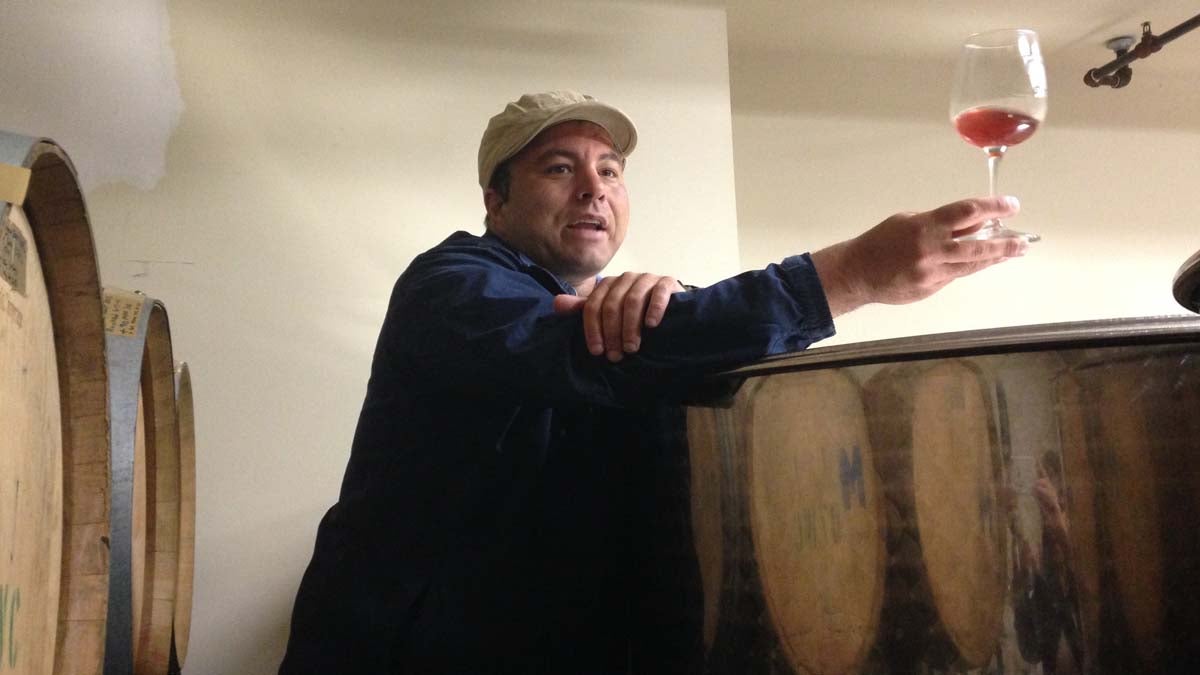Winery owners seek clarity from NJ on events to spur sales of Garden State vintages
Listen
Kevin Celli
Janaka Brooks is planning an elegant, rustic wedding.
Standing inside the cavernous tasting room at Willow Creek Winery in West Cape May, she says she and her fiancé, Matt, aren’t having a cookie-cutter ceremony.
“So what I’m doing is a lot of candles and flowers rather than the chalkboard and DIY mentality,” said Brooks.
The room’s five glass chandeliers and plush leather couches contrast nicely with its barnlike structure. It’s a beautiful space, perfect for the couple’s 200-guest wedding.
Willow Creek can’t exactly call it a wedding. The contract the couple signed specifically calls it a “winery event.” That’s because Willow Creek’s tasting room is on land that has been preserved by the state of New Jersey for agricultural purposes.
The question of whether weddings, birthdays and other “life celebratory events” should be allowed to take place on preserved farmland still awaits an answer. The response hinges on whether New Jersey wine growers can demonstrate that these events are critical to the sale of New Jersey wine.
Garden State wine a new vintage in industry
Chances are you won’t easily find wine from the Garden State on the shelf of your local liquor store or restaurant wine list. New Jersey is a relative newcomer to the fiercely competitive wine business. So the state’s 50 boutique wineries rely on getting people to visit the farm to taste the product.
Kevin Celli, farm director and winemaker at Willow Creek, says weddings help them make that introduction.
“If you have a wedding here at our farm, and 200 people come here, there’s a good possibility that a 190 would have never come to your farm, might have never come to the community, let alone have the opportunity to sample our wines and leave with our wines,” said Celli.
Twenty New Jersey wineries are located on preserved farmland. The state has preserved more than 200,000 acres on farms – buying the development rights to the land and stipulating that it can be used only for agriculture.
The State Agricultural Development Committee, known as the SADC, determines what activities are permitted to take place on preserved farms. And, it says, weddings aren’t allowed.
“If we can’t do weddings, then we’re more than allowed and more than permitted to have a wine festival every weekend until the cows come home. We can do that 100 percent,” said Celli. “So to me it was, ‘What would you rather me do? Would you rather me have an event that brings 200 people to my farm that would never have come there? Or would you rather us have wine festivals every single weekend that we’re permitted to do — and we don’t know if 200 people are coming or 1,000 people are coming?'”
Celli and some other winery owners helped legislators craft a bill that would allow celebratory events under New Jersey’s Right to Farm Act.
After the bill passed in the Legislature, Gov. Chris Christie vetoed it and replaced the bill’s text with the concept of a pilot study to be overseen by the SADC.
State could restrict events at all wineries
“The focus of our pilot program will be to listen, learn, collect as much information as we can,” said Hope Gruzlovic, a spokeswoman for the SADC. “We’re approaching this pilot program with no preconceived ideas.”
As part of the pilot study, wineries are permitted to hold an approved set of events on preserved land. They must obey all local ordinances, and at least 51 percent of their profits must come from the sale of New Jersey wine. Once every three months, the SADC will collect information from the wineries.
“We’re using this 44-month period to learn as much as we can about wineries, special occasion events and the role they play in agricultural operations, how they relate, how they affect the wineries’ bottom line,” said Gruzlovic. “And it certainly could influence how wineries are dealt with in the future, beyond preserved farms.”
And that last part is really critical. Not only did the vetoed bill fail to pave the way for weddings on preserved farms, it opened up the door for a ruling that could affect ALL wineries in New Jersey. Currently it’s still legal to hold these events on land that has not been preserved. But the outcome of the pilot study could change all that.
A blanket regulation that restricts all wineries in New Jersey from hosting events could have major repercussions. The wine industry is the fastest-growing agricultural sector in New Jersey, and at a time when Atlantic City is struggling and the Shore is still rebuilding from Superstorm Sandy, it’s one of the state’s biggest opportunities for tourism.
Kevin Celli isn’t apologetic. He says his West Cape May winery needs these events in order to thrive. So if the SADC rules against him after the pilot program?
“I will tell you that it’ll be another fight for us,” said Celli.
WHYY is your source for fact-based, in-depth journalism and information. As a nonprofit organization, we rely on financial support from readers like you. Please give today.

